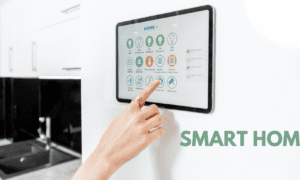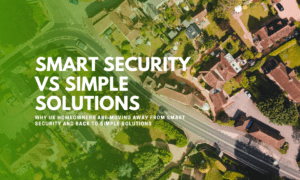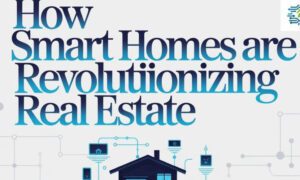The concept of homeownership has undergone a seismic shift in recent years, fueled by technological advancements that are reshaping both smart homes and property finance. With digital innovations at the forefront, managing your home and financing it has become more accessible, efficient, and tailored to individual needs.
The Rise of Smart Homes
What Defines a Smart Home?
A smart home integrates advanced technologies to enhance convenience, security, and energy efficiency. These homes use Internet of Things (IoT) devices like smart thermostats, security cameras, and automated lighting systems to create a seamless living experience. Connected through central hubs or smartphone apps, homeowners can control various aspects of their properties remotely, offering a level of convenience that was once unimaginable.
The Benefits of Smart Homes
Enhanced Security: Smart locks and video doorbells offer robust home protection. They allow real-time monitoring and remote access, ensuring peace of mind even when homeowners are away.
Energy Efficiency:
Devices such as smart thermostats and energy monitors help reduce utility bills by optimizing energy consumption. For instance, smart thermostats can adjust heating or cooling based on occupancy patterns, significantly lowering costs.
Convenience:
Automated systems simplify daily tasks, from scheduling lights to adjusting room temperatures with just a voice command or a tap on a smartphone.
Increased Property Value:
Smart features make properties more appealing to tech-savvy buyers, potentially increasing resale value in a highly competitive market.
Furthermore, smart homes are becoming a cornerstone in the fight against climate change by promoting sustainable energy use. This combination of benefits positions them as the future of modern living.
The Intersection of Smart Tech and Property Finance
Technology in Mortgage Applications
Traditionally, applying for a mortgage involved mountains of paperwork and lengthy approval processes. Today, technology has completely transformed these procedures:
Online Platforms:
Many lenders now offer fully digital mortgage applications. Borrowers can submit documents, track progress, and receive updates in real-time without ever stepping into a bank.
AI-Powered Assessments:
Artificial intelligence evaluates creditworthiness quickly and accurately, reducing approval times while improving reliability.
Blockchain Technology:
Blockchain ensures transparency and security in transactions, minimizing fraud risks and creating an immutable record of financial activities. These innovations not only save time but also enhance user experiences by removing traditional barriers in the mortgage process.
Data Analytics for Better Decisions
Big data analytics is transforming property finance by providing actionable insights:
For Lenders:
Predictive analytics assess risks and determine appropriate interest rates, ensuring fair and data-driven decisions.
For Buyers:
Comprehensive market data empowers buyers to compare properties and neighborhoods based on factors like safety, school quality, and future development potential. The application of big data in real estate is revolutionizing how financial and investment decisions are made, giving all stakeholders greater confidence and clarity.
Fintech Innovations Transforming Homeownership
Digital Platforms for Real Estate Transactions
Modern platforms like Zillow, Redfin, and Opendoor have simplified buying and selling homes. They provide virtual tours, price comparisons, and neighborhood analyses, enabling informed decisions without the need for physical visits. In addition, these platforms foster transparency, ensuring buyers and sellers are well-informed about market conditions.
Crowdfunding for Property Investment
Crowdfunding platforms allow individuals to invest in real estate without purchasing entire properties. These platforms pool resources from multiple investors, making property investment more accessible than ever before. Additionally, this approach diversifies risks and opens doors for small-scale investors to enter lucrative markets.
Smart Contracts
Blockchain-based smart contracts automate and secure real estate transactions. These digital agreements eliminate the need for intermediaries such as real estate agents or lawyers, thereby reducing costs and speeding up the process. Moreover, they provide a transparent and tamper-proof mechanism for completing financial agreements.
Sustainable Financing Options
Green Mortgages
Green mortgages incentivize energy-efficient home purchases by offering reduced interest rates to buyers investing in eco-friendly properties. Features such as solar panels, energy-efficient appliances, and sustainable construction materials qualify for these attractive financial products.
Pay-As-You-Save Programs
These programs finance energy-efficient improvements, allowing homeowners to repay costs through their utility savings over time. This innovative model makes upgrading to smart and sustainable technologies both affordable and practical for more households.
Incorporating green financing options aligns with global sustainability goals, ensuring long-term environmental benefits while reducing financial strain on homeowners.
Future Trends in Smart Home and Property Finance
AI and Machine Learning
AI continues to drive advancements in both smart homes and property finance. Machine learning algorithms predict market trends, optimize energy use in homes, and enhance fraud detection in financial transactions. For example, AI-powered assistants can offer personalized recommendations for mortgage products, ensuring that buyers get the best possible deals.
Augmented and Virtual Reality (AR/VR)
AR and VR technologies are transforming the home-buying experience. Virtual property tours and 3D visualizations allow buyers to explore homes remotely, saving time and effort. Prospective buyers can “walk through” properties without leaving their current locations, offering unparalleled convenience and reducing travel-related expenses.
Integration of Fintech and Proptech
The convergence of financial technology (fintech) and property technology (proptech) is creating holistic solutions for homeownership. From digital escrow services to AI-driven property valuations, this integration streamlines the entire process. Additionally, mobile applications now offer end-to-end solutions, combining financing, property search, and management tools into a single platform.
Conclusion
The fusion of smart home technology and innovative property finance solutions is revolutionizing homeownership. These advancements not only simplify processes but also empower homeowners with more control, efficiency, and opportunities. Furthermore, the integration of sustainable financing options ensures that these innovations align with global environmental goals. As technology continues to advance, the future promises even more groundbreaking innovations that will shape the way we buy, finance, and live in our homes. With these trends accelerating at a remarkable pace, the possibilities for homeowners are virtually limitless.



































